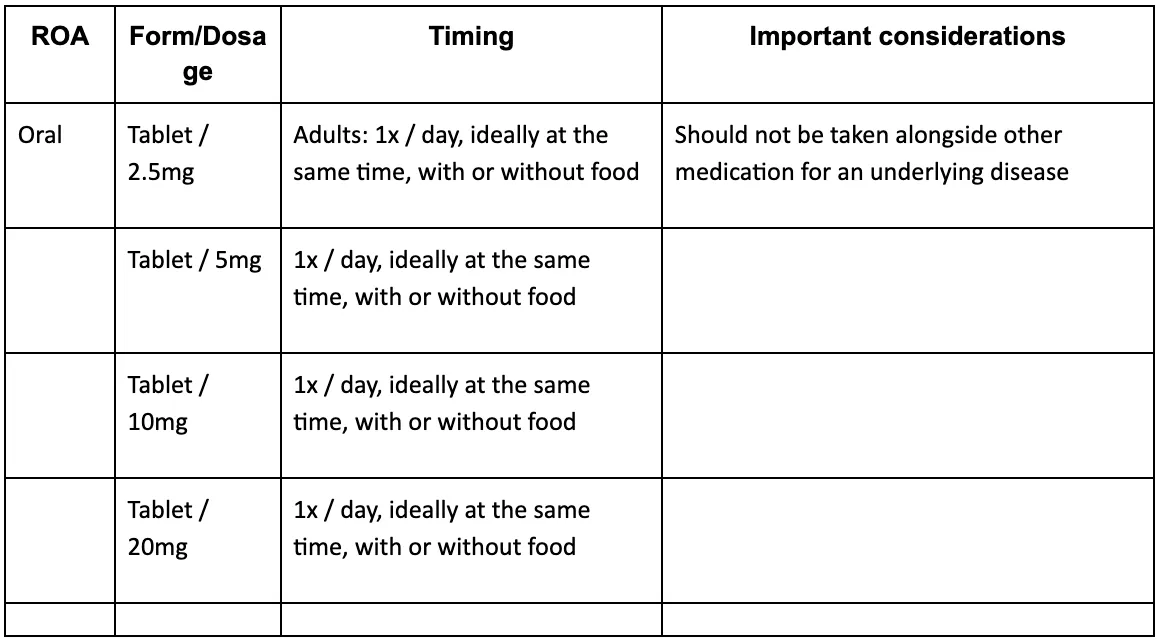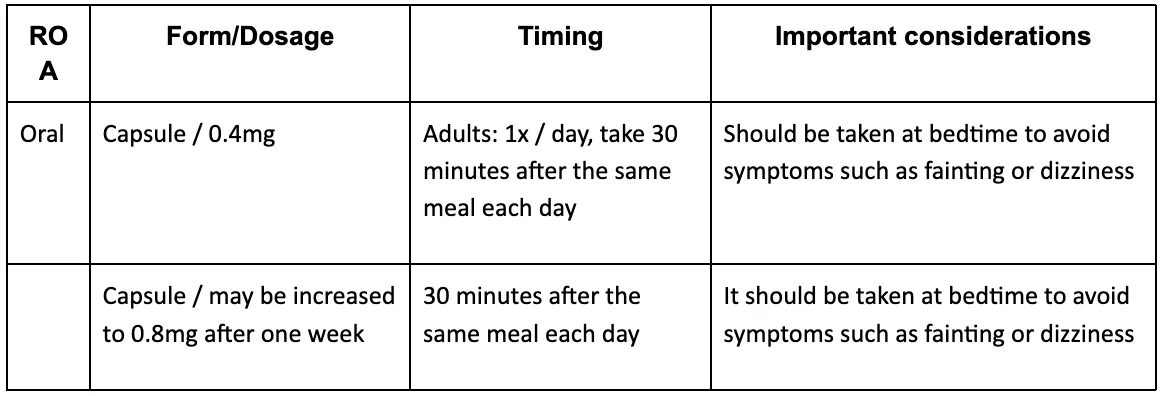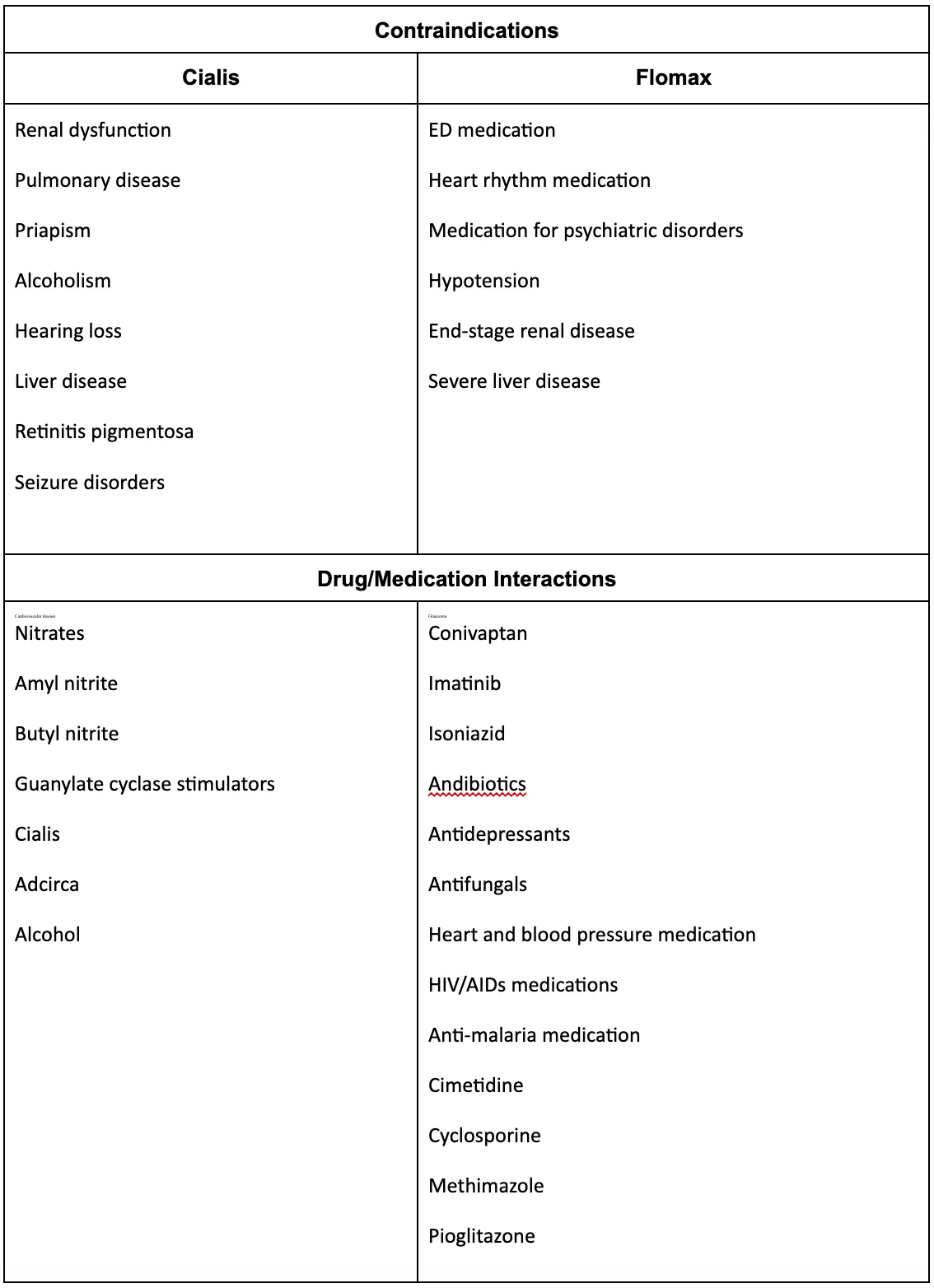Cialis vs Flomax
Introduction
Benign prostatic hyperplasia, or BPH, is a medical condition of a part of the male reproduction system known as the prostate gland. Left untreated, BPH can result in some major side effects, such as the frequent need to urinate, which oftentimes occurs in the middle of the night. While BPH is common among older males, it can also affect those in their 50s as well.
The good news is that BPH treatment has come a long way over the past few years, which means that it is easier to get the treatment you need for BPH, regardless of your age. Two of the most popular treatment options for BPH include Flomax (Tamsulosin) and Cialis (Tadalafil).
About Cialis and Flomax
Both Cialis and Flomax are used for the treatment of benign prostatic hyperplasia, which is an enlargement of the prostate gland which is noncancerous. Furthermore, Cialis can also be beneficial for the treatment of erectile dysfunction. It is important to note that both Cialis and Flomax belong to different classes of drugs, as Cialis is a phosphodiesterase inhibitor, while Flomax works as an alpha-blocker.
What is Cialis?
Cialis is a prescription medication that is orally ingested.
What conditions is Cialis approved to treat?
Currently, Cialis is approved and is widely being used for the treatment of erectile dysfunction or ED in men and for the treatment of benign prostatic hyperplasia.
How does Cialis work for BPH and ED?
Cialis is considered to be an effective treatment option for ED because it helps inhibit the enzyme known as phosphodiesterase type-5, also known as PDE5. This enzyme is present in the male penis, and inhibiting it encourages vascular relaxation while increasing blood flow. It is important to note that exactly how Cialis works on BPH is not fully established yet.
What is Flomax?
Flomax or tamsulosin hydrochloride is an alpha-blocker.
What conditions is Flomax approved to treat?
Flomax is used for the treatment of benign prostatic hyperplasia or BPH.
How does Flomax work for BPH?
Flomax, also known as Tamsulosin, is an alpha blocker that helps block a particular receptor that's present in the male prostate gland. This helps relax the muscles of the bladder and the prostate so that it's easier to urinate.
Effectiveness
When it comes to the treatment of BPH, Flomax is considered to be the go-to option according to the 2021 treatment guidelines that were released by the American Urological Association. Flomax has been deemed highly effective for the treatment of both severe and mild BPH symptoms.
How effective are Cialis and Flomax for treating BPH?
Both Cialis and Flomax are considered to be effective in the treatment of BPH; however, while Flomax is designed to help restore the flow of urine in men who have symptoms of BPH, Cialis not only helps reduce the symptoms of BPH but is also useful in the treatment of erectile dysfunction.
Dosage Information
Following the right dosage is crucial to the treatment of any ailment, and BPH is no exception. When it comes to using Flomax or Cialis for the treatment of BPH, there are clear dosage guidelines that must be followed in order to get favorable results. Additionally, following the recommended dosage for taking Cialis and Flomax is also going to reduce the risk of developing any unwanted side effects during treatment.
How is Cialis administered for BPH?
For the treatment of BPH, it is recommended that only a dose of 5mg be administered once a day. This is the same dosage for those who are looking to treat symptoms of both BPH or ED and BPH simultaneously. Since a single dose of Cialis is sufficient for the entire day, there is no need to play your sexual activity around the dosage.
Cialis dosage information
The following is the dosage information for using Cialis for the treatment of BPH.

How is Flomax administered for BPH?
Flomax capsules are to be taken orally, usually once per day, for the treatment of BPH. It is recommended that the first dose be taken during bedtime to minimize any chances of fainting or dizziness.
Flomax dosage information
The following is some important information on dosage when taking Flomax for treating the symptoms of BPH.

Side Effects
Side effects are a major concern when taking any medication, and Cialis and Flomax are no exception. When it comes to these two medications, there are certain side effects that the user needs to be aware of before using them for the treatment of BPH.
What are the most-common side effects of Cialis?
The following are some of the most common side effects of using Cialis for the treatment of Benign prostatic hyperplasia in males;
- Stomach upset
- Prolonged erections
- Nausea
- Muscle or back pain
- Memory problems
- Low blood pressure
- Headaches
- Flushing
- Flu-like symptoms
- Dizziness
- Diarrhea
- Blurry vision
- Abnormal ejaculation
Are there any potential serious side effects of Cialis?
Potential serious side effects of using Cialis include;
- Vision impairment
- Prolonged and painful erection
- Changes in blood pressure
- Allergic reactions
* If you experience any of these serious side effects, seek medical help immediately
What are the most-common side effects of Flomax?
The following are some of the most common side effects of using Flomax for the treatment of Benign prostatic hyperplasia in males;
- Abnormal ejaculation
- Back pain
- Blurred vision
- Cough
- Decreased sex drive
- Dental problems
- Diarrhea
- Dizziness
- Drowsiness
- Headache
- Lightheadedness
- Nausea
- Runny or stuffy nose
- Sleep problems (insomnia)
- Sore throat
- Weakness
Are there any potential serious side effects of Flomax?
Potential serious side effects of using Flomax include;
- Skin blistering
- Swelling of face, throat, or tongue
- Difficulty breathing
* Though serious side effects rarely occur, if you experience any of these serious side effects, seek medical help immediately
Contraindications and interactions
Both contraindications and interactions are the reasons why a particular drug should not be used or at least be used with extreme caution. Contraindications and interactions relate to drug-disease, drug-food, and drug-on-drug interactions.
Warnings and general precautions for Cialis and Flomax
Cialis is known to cause a sudden drop in blood pressure if taken alongside nitrate medication. Using Cialis could also lead to a stroke or heart attack. Flomax can cause the body to become overheated if exercising or staying too long in the sun. Also, it is recommended not to use Flomax if you are allergic to Tamsulosin, which is another medication that is used for the treatment of enlarged prostate.
Contraindications and important interactions for Cialis and Flomax


Cost Comparison
Both Cialis and Flomax are brand names. Cialis tablets come in quantities of 30, while Flomax is sold in packs of 100 capsules. In the per-unit cost comparison of these two medications, Cialis does cost more per unit as compared to Flomax.
How much do Cialis and Flomax cost?
As mentioned, Cialis is sold in packs of 30 tablets, which costs $2,205. This comes to an estimated $73 per unit. Flomax is sold in a pack of 100 capsules. Its total cost is $1,033, which breaks down the per-unit cost to $10.34.
Popularity of Cialis and Flomax
While Cialis was approved on November 21, 2003, the medication Flomax has been around for longer, first gaining approval on April 15, 1997. Both of these medications have a similar half-life, with Cialis having a half-life of 17.5 hours and Flomax having a slightly longer half-life at 19 hours. Cialis has an average popularity rating of 8.5 out of 10, while Flomax has an average rating of 5.9 out of 10 on Drugs.com.
Conclusion
Cialis has traditionally been used for erectile dysfunction and benign prostatic hyperplasia or BPH, while Flomax is used for benign prostatic hyperplasia. Both medications are considered to be relatively effective when it comes to the treatment of BPH.
Takeaway
Whether you are using Cialis or Flomax, it is important to consult with a doctor or medical professional before you use any of these medications. It is always advised to consult with a physician if you already have any underlying medical condition or are being treated for an underlying medical condition that may interact with the medications.